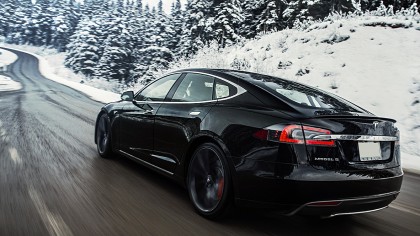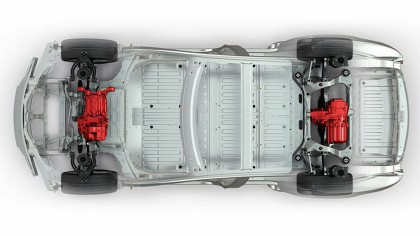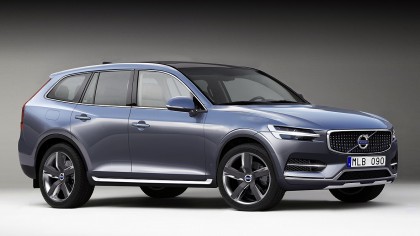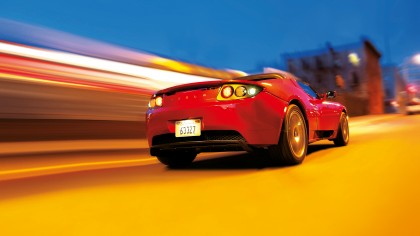Apple self-driving car: everything you need to know
Apple's driverless car plans emerge from the shadows
Sign up for breaking news, reviews, opinion, top tech deals, and more.
You are now subscribed
Your newsletter sign-up was successful
But what if?
The question is, will Apple always be happy with that niche? As Google dabbles in everything from heads-up displays to VR goggles to, yes, self-driving cars, Apple is left looking dull by comparison. Profitable, but dull.
All jokes about not having Windows and poor battery life aside, if the Apple Car were to see the light of day it would undoubtedly feature an electric powertrain. It seems too far-fetched for the maker of the iPhone to suddenly dabble in internal combustion engines.

So, if Apple ever made its own car, a rival to Tesla's beautiful EVs appears to be the most sensible conclusion, and this opens up a number of exciting and innovative features that could one day make it to market.
Seamless integration between Apple's smartphones and smartwatches would be the immediate assumption. Customers would be able to lock and unlock their vehicles simply by having an iPhone tucked in their pocket or an Apple Watch on their wrist.
Apple would also likely allow owners to check on their vehicle's status remotely via a branded device. This would make locating the Apple Car in a busy car park simpler; customers could remotely heat and cool their vehicles, as well as receive notifications on charge status.

The thing is, none of that is new. BMW and Tesla already offer this kind of connectivity via smarpthone apps, but it seems fair to assume Apple's integration of software would be more creative, powerful and impressive.
Design would also play a major part in the process – with Apple responsible for some of the most stylish technology products of the last decade, there's no doubt they'd try to make "Car" as stylish as possible. They would want it to look different to existing cars, too.
Sign up for breaking news, reviews, opinion, top tech deals, and more.
However, we're talking here about a mature industry where some of the greatest designers in history have spent billions of dollars to create the most beautiful and aerodynamic cars possible. Can Apple really bring anything new to that particular party?
Yes, it can, if cars no longer look or behave like cars as we know them.
Now, some reports have suggested Apple wants to get its hypothetical car project off the drawing board by 2020. This date just happens to coincide with the automotive industry's prediction of when we will see the first autonomous vehicles going on sale.

Mercedes-Benz also believes that we will see legislation change in the next few years that will allow certain aspects of autonomous driving to be legalized.
If Apple's car is to be produced, it will be released into an environment where emailing, texting and catching up with online news while behind the wheel will no longer land you in jail.
When that happens, car design will no longer need to be based around forward-facing seats and aerodynamics. They will have the scope to become more like offices or rooms on wheels. Apple will be able to bring truly fresh design ideas to bear, while traditional auto marques continue to build and market cars as things to drive.
This would also allow the brand to Apple-ize the way we interact with in-car entertainment, employing its usual neat approach – intuitive, simple UIs, extended ecosystems and seemingly irresistible content flogging – to own the in-car entertainment space.
It'll beam news to interior touchscreens, pump iTunes music through a cutting-edge, 15th-generation Beats sound system and stream movies to Retina Displays. And the windows will be touchscreens with artfully placed streaks of virtual water flowing down them – so much better than the view outside.

"A car is becoming more of a microprocessor and a software-driven device rather than a mechanical product," Mike Ramsey said.
"Apple might not be looking at the car as a margin and profitability assessment, rather as an investment area. Just look at Nvidia and Qualcomm: the automotive industry has quickly become their second biggest client after the tech firms."
Our view? For now, Apple will continue to push CarPlay and iPhone/iPad integration to existing car brands. Its bouts of hiring from the auto industry are to ensure it remains the biggest player in smartphone integration into cars.
Then, Apple will move to supplying the AI smarts to self-driving cars, potentially launching its own driverless shuttle service for employees with an established automaker.
In fact, as long as humans are required to make cars drive, Apple won't make one. However, as driverless cars become the norm, automotive is exactly the kind of area Apple could muscle into and disrupt. The road to that day is likely to be a long and winding one, though.

Michelle was previously a news editor at TechRadar, leading consumer tech news and reviews. Michelle is now a Content Strategist at Facebook. A versatile, highly effective content writer and skilled editor with a keen eye for detail, Michelle is a collaborative problem solver and covered everything from smartwatches and microprocessors to VR and self-driving cars.